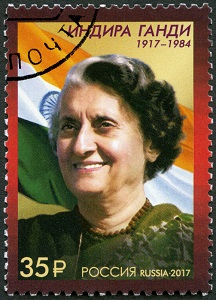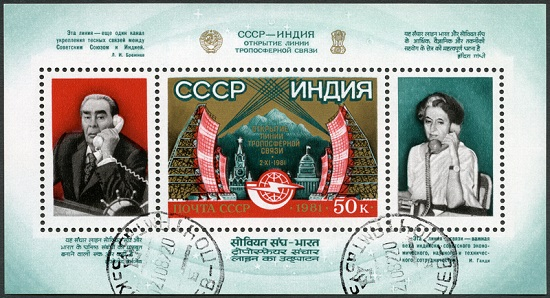

 The Iron Lady, or Indira Priyadarshini Gandhi, was India's first female prime minister and a prominent figure in Indian political history. She served as the Indian National Congress's symbol. Jawaharlal Nehru, the father of Indira Gandhi, was the first Indian Prime Minister to back M.K. Gandhi in the struggle for independence. She presided from 1966 to 1977 and again from 1980 until she died in 1984. She remained Chief of Staff in the highly integrated Jawaharlal Nehru government from 1947 until 1964.
The Iron Lady, or Indira Priyadarshini Gandhi, was India's first female prime minister and a prominent figure in Indian political history. She served as the Indian National Congress's symbol. Jawaharlal Nehru, the father of Indira Gandhi, was the first Indian Prime Minister to back M.K. Gandhi in the struggle for independence. She presided from 1966 to 1977 and again from 1980 until she died in 1984. She remained Chief of Staff in the highly integrated Jawaharlal Nehru government from 1947 until 1964.
Indira Gandhi was born on November 19, 1917, into a distinguished family. She was Jawaharlal Nehru's daughter. Indira Gandhi received her education at prestigious colleges including Somerville College in Oxford, Ecole Nouvelle in Bex, Pupils' School in Poona and Bombay, Badminton School in Bristol, and Vishwa Bharati in Shantiniketan.
She received honorary doctorates from several universities all around the world. She had a stellar academic record, earning her a Citation of Distinction from Columbia University.
Deeply committed to the struggle for freedom was Smt. Indira Gandhi. She founded the "Bal Charkha Sangh" and the "Vanar Sena" of children in her early years to support the Congress Party in the Non-Cooperation Movement.
Under the leadership of the then-prime minister Lal Bahadur Shastri, she served as minister of information and broadcasting. After Lal Bahadur Shastri passed away in 1996, she was chosen as the Congress legislative party's leader.
After winning the 1971 elections, Indira Gandhi once more served as prime minister. She was India's second-longest-serving prime minister, holding the position from January 1966 to March 1977.
As a prime minister, she contributed many policies to the welfare of India. She was a great leader like her father Jawahar Lal Nehru.
The green revolution, bank nationalisation, and mild tax rises on higherincome Indians were all characteristics of the Indira Gandhi government's economic policy.
Gandhi served as Prime Minister for three Five-Year Plans, two of which achieved the desired growth. From 1966 to 1984, throughout Indira Gandhi's tenure as prime minister until her assassination in 1984, the domestic policy of her government served as the domestic policy of India.
She focused on social economics, social welfare and social affairs. And she implemented all these through her different policies.
The Iron Lady of India, Indira Gandhi, passed away on October 31, 1984. And she was killed by her two bodyguards.
The Sikhs in Punjab initiated a movement in the late 1970s and early 1980s that turned violent and destructive in its pursuit of an independent Khalistan. So Indira Gandhi began Operation Blue Star. The Indian Army executed numerous Sikh supporters of Khalistan who participated in terrorism. This is the reason Indira Gandhi's private Sikh bodyguards killed her.
Indira Gandhi's words in a speech before her death were remarkable. And a few words from it were: I don't care if I live or die. I've been around a long time, and I'm happy to have dedicated my entire life to serving my country.
Indira Gandhi met Feroze Gandhi as a friend in Great Britain. They were acquainted because of Allahabad.
Indira Gandhi and Feroze Gandhi got married in Allahabad in 1942. The couple welcomed their first child, Rajiv Gandhi, on August 20, 1944. Rajiv Gandhi went on to become India's youngest prime minister.
Sanjay Gandhi, the couple's second son, was born on December 11, 1946. Sanjay Gandhi passed away from a heart attack in 1960.
According to Indira Gandhi, women's education is almost more important than the education of boys and men. She not only mentioned Indian women but women all over the world.
Indira Gandhi wanted young women to receive a sort of education that enables them to analyse and decide what they have to accept and deny in the changing world and want them to contribute power.
Despite pressure from the United States, Indira Gandhi overcame Pakistan and helped free East Pakistan to become an independent Bangladesh.
After her contribution to the Indo-Pakistan war, she was known as “Goddess Durga”.
She left behind the 42nd Amendment to the Indian Constitution, which was adopted during the Emergency.
She was listed as 100 most influential women in 2020 Time Magazine.

USSR - CIRCA 1981: A stamp printed in USSR shows Leonid Brezhnev 1906-1982 and Indira Gandhi 1917-1984, devoted 1st direct telephone link Soviet Union with India, circa 1981
| Awards and Honours | Year |
|---|---|
| Bharat Ratna | 1972 |
| Mexican Academy Award | 1972 |
| Sahitya Vachaspati | 1976 |
| Italian Isabella d'Este Award | 1953 |
Indira Gandi is known as "The Iron Lady of India". She was the first female prime minister in India. She is the daughter of great Pandit Jawaharlal Nehru. Her powerful presence internationally aided in the emergence of India as a potential global superpower. After helping India to win Indo-Pakistan War, she was also called “Goddess Durga”. And operation Blue Star to terminate terrorists caused her reason for death by her bodyguards.
Q1. What is the slogan of Indira Gandhi?
Ans. The campaign's theme and slogan were "Remove poverty, save the country" in Hindi it is "Garibi Hatao Desh Bachao," during the 1971 election.
Q2. What is Indira Gandhi's emergency?
Ans. In 1957 July and August Indira Gandhi declared an emergency in India. And this was approved by the president as Indira Gandhi's last proposal. Its foundation was the idea that the Indian state was under immediate internal and external threat.
Q3. What advice did Indira get from her father?
Ans. Jawahar Lal Nehru advised Indira Gandhi not to do anything in secret. Nehru wished his daughter to grow up into a brave soldier in the service of India. She followed her father’s advice and became an eminent political leader.